Related Research Articles

"Prisoner of Society" is a song by Australian punk rock band The Living End. It was originally released in Australia on the 1997 EP "Second Solution / Prisoner of Society". The song was later released as a single, separate from the EP, in the United Kingdom in 1998.
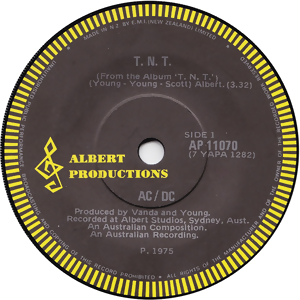
"T.N.T." is a song released in 1975 by Australian hard rock band AC/DC, taken from their Australian album T.N.T. and the international version of High Voltage. It was released as a single in 1976 and was written by Bon Scott, Angus Young and Malcolm Young. It peaked at No.19 on the Australian Kent Music Report Singles Chart. The song's title is a reference to the explosive chemical TNT.

"You're the Voice" is a song written by Andy Qunta, Keith Reid, Maggie Ryder and Chris Thompson, and recorded by the Australian singer John Farnham and released as a single in September 1986 ahead of his album Whispering Jack. "You're the Voice" was one of the biggest hits of 1986 in Australia, topping the Kent Music Report singles chart for seven weeks from 3 November to 21 December. At the ARIA Music Awards of 1987 it won Single of the Year.
"Evie" is a rock song performed by Australian singer and former frontman of the Easybeats, Stevie Wright. It was written by Harry Vanda and George Young and released as a single in 1974. It has been suggested that it is the first 11-minute song to chart at #1 anywhere in the world.

"Don't Change" is a song by Australian rock band INXS. It was released as a single from the album Shabooh Shoobah in October 1982. It has been described as the band's first international single. "Don't Change" peaked at number 14 on the Australian Singles Charts and reached number 80 on the Billboard Hot 100 and number 17 on the Billboard Top Tracks chart.

"When the War Is Over" is a power ballad of Australian band Cold Chisel from their 1982 album Circus Animals. The song was written by drummer Steve Prestwich and issued as the third single from the album, peaking at number 25 on the national singles chart, and also resurfaced in August 2011 due to download sales.

Living in the 70's is the debut album by Melbourne band Skyhooks. Released in October 1974 on the Mushroom Records label, the album achieved relatively little success until early 1975. It spent 16 weeks at the top of the Australian album charts from late February 1975, and became the highest-selling album by an Australian act in Australia until that time, with sales of 240,000. In October 2010, it was listed at No. 9 in the book 100 Best Australian Albums. The album's eponymous track was ranked number 72 as part of Triple M's "Ozzest 100", the 'most Australian' songs of all time ranking.
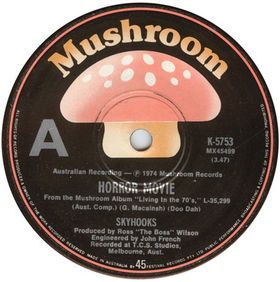
"Horror Movie" is a song by Australian band Skyhooks, released in December 1974 as the second and final single from the band's debut studio album, Living in the 70's. The song peaked at number one in Australia, staying there for two weeks in March 1975. The single was greatly helped along by the band's appearance on the then-new ABC pop music TV show Countdown.

"Errol" is the second single by Australian surf rock band Australian Crawl taken from their 1981 album Sirocco. The song was written by James Reyne and Guy McDonough and sung by McDonough instead of Reyne, and is a lyrical biography about Australian-born actor Errol Flynn. It was produced by Peter Dawkins.

"Mascara" is the second single released by Australian rock band Killing Heidi from their debut album, Reflector (2000). It was released on 10 November 1999 while their debut single, "Weir", was still active on the charts. The re-release of the "Mascara" single was issued with "Leave Me Alone" as its B-side; it was this version that topped the Australian Singles Chart, becoming Killing Heidi's only number-one hit in their native country. "Mascara" was later released in the United States.
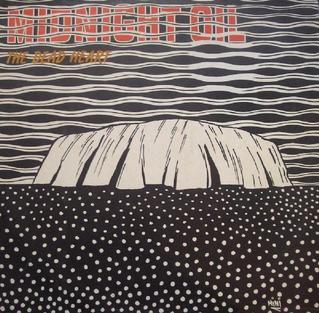
"The Dead Heart" is a song by Australian rock band Midnight Oil. It was first released as a single in Australia in 1986 and in the United Kingdom and the United States in 1988 after it had been included on the 1987 album, Diesel and Dust. It peaked at number four on the Australian singles chart and at number 11 on the U.S. Mainstream rock chart. The song deals with the mistreatment of indigenous Australians and the nonrecognition of indigenous cultures in Australia, and was part of efforts to raise awareness of Australia's Stolen Generations - the forcible removal of Australian Aboriginal children from their families between 1909 and the 1970s.
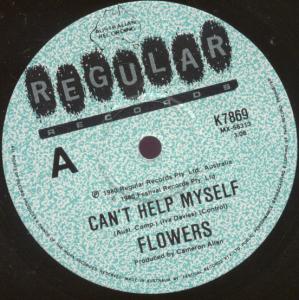
"Can't Help Myself" is the first single released by the Australian synthpop/rock band Flowers, later known as Icehouse. It was released in May 1980 as a 7" vinyl single on independent label, Regular Records, five months ahead of debut album Icehouse. A 10" vinyl single was released in July and had a cover depicting individual images of band members diagonally across the band's name and the single's title. It peaked at #10 on the Australian Singles Charts.
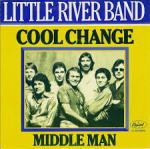
"Cool Change" is a hit song by Australian rock group Little River Band written by lead singer Glenn Shorrock. It was the second single from their sixth album, First Under the Wire. Released in August 1979, "Cool Change" did not reach the Australian Kent Music Report Singles Chart top 50. It was released in the United States in 1979 on the Capitol Records label and peaked at number 10 on the Billboard Hot 100 the week of 19 January 1980.

"Boys in Town" is the debut single by Australian rock band Divinyls, released in 1981. The song was written in 1979 and was used on the soundtrack of the 1982 film Monkey Grip, along with several other Divinyls tracks written and recorded for the film, including the single's b-side "Only You". "Boys in Town" was also included on the international version of the Divinyls 1983 debut studio album, Desperate. The song became a success in Australia, entering the singles chart top ten and peaking at number eight.

"Solid Rock" is a song written by Shane Howard and recorded by Australian rock band Goanna. The song deals with issues of land rights for Indigenous Australians and was released in September 1982 as the lead single from the band's debut studio album, Spirit of Place. "Solid Rock" peaked at number 3 on the Australian Kent Music Report.

"Just Like Fire Would" is a song by Australian alternative rock band, the Saints, which is written by the band's lead singer, Chris Bailey, and was released as a single in March 1986. It was the lead single from their seventh studio album, All Fools Day, and peaked at No. 29 on the Kent Music Report Singles Chart. It was produced by Hugh Jones, who had co-produced the album with Bailey. AllMusic's John Dougan reviewed All Fools Day and opined, "One listen to songs as grabbing as 'Celtic Ballad' or the great 'Just Like Fire Would' will convince you that despite the differences, the new Saints were a good band for completely different reasons than the old Saints."
"The Unguarded Moment" is a song by Australian alternative rock band The Church, released in March 1981. It was the second single from their 1981 debut album, Of Skins and Heart. It was written by Steve Kilbey, the group's frontman, singer and bass guitarist; and Mikela Uniacke, who were married at the time.
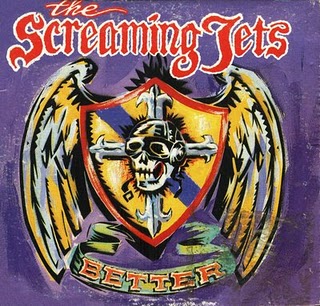
"Better" is a song by Australian rock band The Screaming Jets. The song was released in February 1991 as the official lead single from their debut studio album All for One (1991). The song peaked at number 4 on the ARIA Charts and was certified gold.

"Come Said the Boy" is a song by Australian rock band Mondo Rock, released in November 1983 as the lead single from the band's fourth studio album The Modern Bop (1984). The song became the band's highest-charting single, peaking at number 2 on the Kent Music Report. It was written by the group's lead guitarist, Eric McCusker, and was co-produced by John Sayers and the band.

"Don't Throw Stones" is a song recorded by Australian rock band The Sports. The song was written by band members Stephen Cummings and Andrew Pendlebury. Released in February 1979 as the second single from the band's second studio album, Don't Throw Stones (1979), the song peaked at number 26 on the Australian Kent Music Report.
References
- ↑ "Skyhooks - Living in the 70's (1974)". YouTube. 5 June 2016. Retrieved 5 June 2021.
- ↑ "Here Are The Songs That Made Triple M's 'Ozzest 100'". Musicfeeds. 27 January 2018. Retrieved 4 January 2020.
- ↑ Kent, David (1993). Australian Chart Book 1970–1992 (illustrated ed.). St Ives, N.S.W.: Australian Chart Book. p. 277. ISBN 0-646-11917-6.